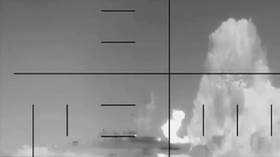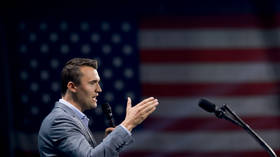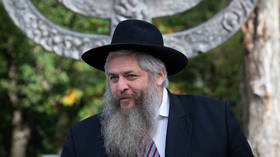Fight root causes of terrorism, not symptoms – Lavrov to Bloomberg
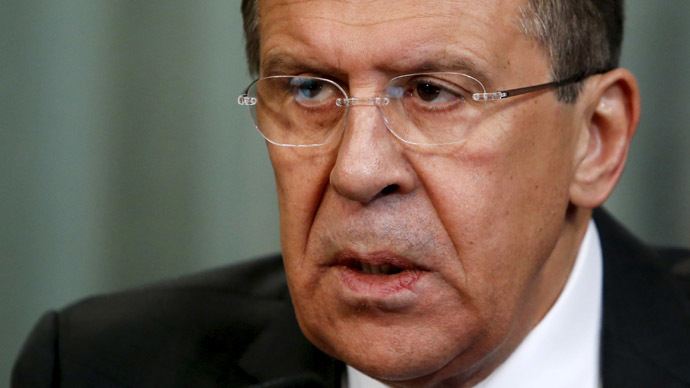
Russian Foreign Minister Sergey Lavrov sits down with Bloomberg to discuss thorny international issues such as the US-led bombing campaign against Islamic State terrorists, the FIFA corruption scandal and Russian-American relations.
READ MORE: US-led coalition against ISIS in Iraq, Syria 'mistake' - FM Lavrov
Q:He is Vladimir Putin's right hand man for foreign policy, and he is at the helm of Russia's diplomatic arm at a time, when relations with the West are at a post-Cold War low. Sergey Lavrov, thank you very much for joining. I want to start by asking you about your recent meeting with the US Secretary of State John Kerry. You met with him for several hours in Sochi. The two of you sat down together with the Russian president. What is this? Is this the beginning of a thaw in relations between Russia and the United States?
A: I believe this is the realistic approach, getting the upper hand. I was a bit surprised that people paid so much attention to the fact that John Kerry spent several hours with the Russian leader and with his counterpart. Because if you take 2014, the year of the crisis in Ukraine, which was used by some people to try to derail the relations between Russia and the West, last year John Kerry and myself, we met 17 times. More than any of my counterparts, I saw John Kerry. And every time it was several hours. And it was a businesslike discussion on Syria, Yemen, Iraq, Afghanistan, Ukraine of course. And the fact that another round of talks took place on the Russian soil, it's a welcome sign, but more symbolic, rather than substantive.
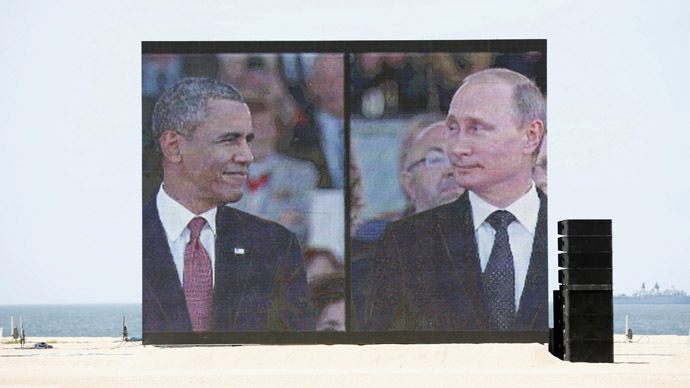
Q:That's what I want to ask you about, because I guess the issue here isn't the quantity of time you spend together, but the quality of the time, right? In 2009, we had the so called "reset" in Russian-American relations, which as you know didn't go very far at all. I know you said that what we are seeing now with Russian-American relations isn't a reset. Why not?
A: Well, if you take the original reset, it was not our invention, it was the invention of Hillary Clinton and Obama administration's, because with their predecessors - George Bush, Jr. - Vladimir Putin had very good personal relations. I was on good terms with Condoleezza Rice. But somehow this good personal chemistry didn't go down to the practical political level. And the American administration, when Barack Obama became president, they re-assessed the state of bi-lateral relations with Russia. And they decided that it is much better to have more forthcoming approach. It was a reset of the American policy vis-a-vis Russia. Then the Presidential Commission was created, 21, I think, working groups, covering each and every imaginable area of human activity. And then all this was abruptly stopped, because we could not and did not accept the coup which was strongly supported and welcomed by the United States, the coup in Ukraine.
Now I believe we are quite realistic. President Putin from time to time talks to President Obama over the phone. They are very pragmatic, they discuss specific areas of cooperation, where both countries could benefit. And we do the same with John Kerry on a much more detailed level. I wouldn't call it a new reset, I would call it the realization of the need for normalcy.
Q:So if we get into the necessity or the need for normalcy in relations, in real politic, working on issues where you can find common ground... You mentioned one of the issues you've been discussing is Syria. Last week you said... Effectively called on the US to work with Assad in Syria to combat Islamic State. Nice idea, immediately rejected by the United States. Is there anything, peace talks aside, that rhetoric aside, that you can point to, where Russia is actually working right now with the US to counter Islamic State?
A: We would prefer to do this on a collective basis, on the basis of international law, through the Security Council. Unfortunately, the Americans, when they announced this crusade against ISIL in Iraq and Syria, they never came to the Security Council. They just announced the coalition. And they announced that the Iraqi government gave its consent to the air-strikes on its territory against the positions held by ISIL. They also announced that they would do the same in Syria without asking the Syrian government and without going to the Security Council. I believe it was a mistake. I think that just obsession with the personality of President Assad is not making any good to the common cause of fighting terrorism. And when our American colleagues say that he cannot be considered as a legitimate partner, we always remind them that he was perfectly legitimate when we went to the Security Council to adopt a resolution on Syrian chemical weapons disarmament. The resolution of the Security Council, supported by the United States and joint consensus in the United Nations, was welcoming the decision of the Syrian government to join the Convention on Chemical Weapons and the cooperation the Syrian government provided. So they were perfectly legitimate.
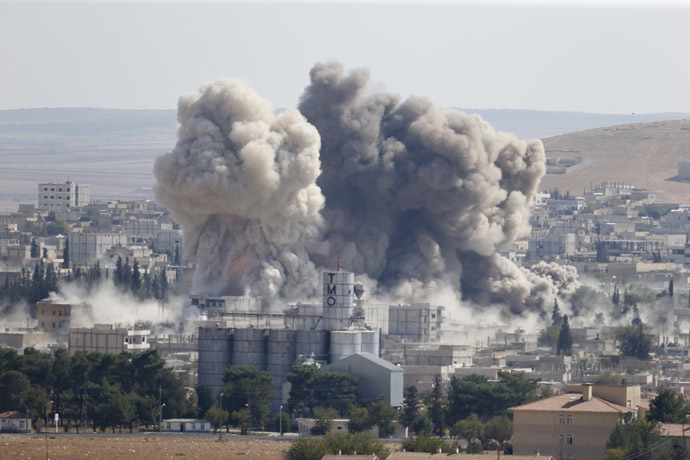
Q:Have you gotten any indication... One of the things you've long demanded is that the US drop this idea of regime change in Syria. Have you gotten any indications whatsoever from the US that they are prepared to leave President Assad in power?
A: It's not for the United States to decide. It's not that we want them to change their mind, and if this happens, everything will fall into place.
Q:Mr. Foreign Minister, if we return to Sochi though, you spent several hours in a room with the Russian president, with John Kerry, the issue obviously would've come up. Did you get any sense, because certainly the rest of the world is aware...
A:I cannot get into nitty-gritty of what we discussed...
Q:Because?
A: For obvious reasons, but we certainly believe that there is only political settlement, which is possible for Syria. And we also believe that the Geneva Communiqué of three years ago is the basis. Especially since it was endorsed by the Security Council resolution, which was also adopted by consensus. And this resolution and the Geneva philosophy provides for creation of transitional governing organ on the basis of the consent, mutual consent among the Syrians.
The efforts we are now taking – and I understand that the United States is ready to go along with the efforts of the special envoy of the United Nations Staffan de Mistura – these efforts are exactly intended to build ground for all the Syrians, for all parts of the Syrian society to be able to participate in the political process. Some countries are categorically against starting this process while President Assad is still in power. I believe that this would have to be resolved by the Syrian people. And those of outside players who can influence the Syrian groups, they must make a choice: what is a bigger threat, the personality of the Syrian president, or ISIL and the like?
Q:Ok. Islamic State – now that we’re discussing it here in Moscow, meanwhile, in Paris, as you know, there is that anti-Islamic State coalition meeting. Why aren’t you there?
A: As I said, we would prefer to have a coalition which is firmly based on international law.
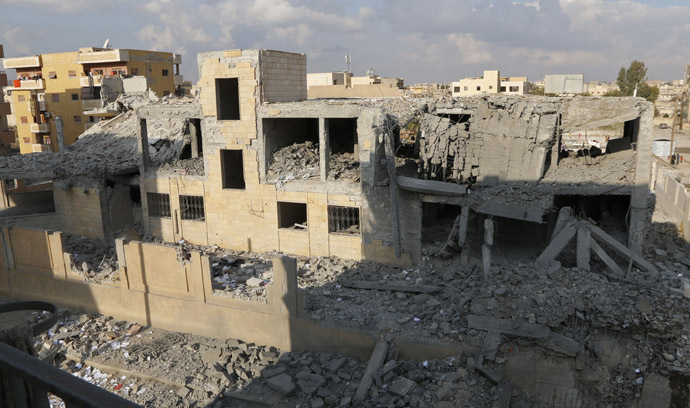
Q:Yeah, but this is a coalition that exists of Arab nations and Western countries that are interested in resolving the conflict there. I guess the question is: is this a rhetorical conversation or can Russia provide a partnership with other countries to resolve this issue?
A: We are not against what this coalition is going, of course, because they are trying to weaken a very bad group of terrorists.
Q:So why not join them?
A: But we have been contributing to the fight against this group long before this coalition has been created. We have been providing the necessary weapons to Iraqi government when the Americans were reluctant to do this, because they wanted some, you know, conditions to be fulfilled by the Iraqi authorities. And the conditions were related to the need to rectify the mistakes made twelve years ago, when the American governor general – or whatever he was called – Paul Bremer dismantled all the Sunni structures in Iraq, after Saddam Hussein was toppled under the pretext of WMD, you know the rest. And we have been providing weapons to Syrian government to increase both Syrian and Iraqi ability to fight terrorists on the ground. Everyone understands and publicly admits that just airstrikes are not going to do the trick.
Q:So give us your forecast! If the current strategy for dealing with Islamic State doesn’t work, how far do you see Islamic State getting?
A: Very far. They already make a lot of progress in Iraq, in Syria…
READ MORE: ISIS rise provoked by outside interference into Middle East, North Africa – Putin
Q:Do you see Islamic State taking Syria? Is that possible?
A: They just took the Idlib province. And they already have their emissaries seen in Libya and even in northern Afghanistan, which is very close to Central Asia – which is next door to Russia. You know, we want to cut the financing of ISIL, and not only ISIL, but Jabhat an-Nusra and the like. And it was the Russian Federation who proposed the resolution, recently adopted by the Security Council, on the need to cut any oil purchases from the territories controlled by the terrorists. And I believe we need to make another step in the Security Council and to create some mechanism to attribute who is buying this oil. We have to fight not the symptoms, but the root causes. And we proposed last September to have collective effort under the umbrella of the Security Council to analyze, to have a comprehensive analysis of the terrorist threat in this region, and to make sure we address these terrorists in the same way, irrespective of where they appear; not to repeat the situation when many countries publicly routed the Security Council arms embargo on Libya, and they were bragging publicly that they were supplying arms to the rebels who wanted to topple Qaddafi and they were arming these rebels. And then, a few weeks later, a few months later, they were facing the same rebels armed by Europeans in Mali! So we have, you know, if it walks like a duck, it looks like a duck, it’s a duck.
Q:Yeah, but if we could return to how bad you think things could get, my question to you was: could Islamic State take Syria? The answer is…
A: If people continue to acquiesce with what is going on, and continue to acquiesce with those who categorically refuse to start the political process…
‘2,300 Humvees in Mosul alone’: Iraq reveals number of US arms falling into #ISIS hands http://t.co/e6CdiRl3Qdpic.twitter.com/BfdjC1PXCs
— RT America (@RT_America) 1 июня 2015
Q:Then?
A: …until Bashar Assad disappears, then I’m not very optimistic for the future of this region, because these people put the fate of one person whom they hate on top of the fight against terrorism. We have been through this repeatedly. Saddam Hussein was the one person after whom the United States went – and they ruined the country.
Q:So you say…
A: Qaddafi is the same.
Q:You say that airstrikes aren’t working. Then what would be effective, amongst other things, are ground operations. This is a hypothetical question, and I know you don’t like hypothetical questions.
A: The answer is yes.
Q:But would you support American troops back on the ground in the Middle East to bring peace to the region? It’s a ‘yes’ or ‘no’ question. Airstrikes aren’t working.
A: Do you believe that the American troops are the only troops who can do the trick?
Q:Is Russia going to provide troops?
A: No, no, look: they’ve been to Afghanistan, they’ve been to Iraq, and look where Iraq and Afghanistan are now. I said that it is absolutely clear to me it was a mistake – and still is – not to coordinate the airstrikes with the activities of the Syrian army. That’s what we believe must be done. And that’s what unfortunately our American colleagues cannot accept from ideological considerations.
Q:I’ll take that as a ‘no’. Let’s move to Iran. The deadlines…
A: No, no, look: if the Syrian government…
Q:…welcomes US troops in Syria?
A: …invites the coalition to come, then the volunteers would certainly have to be found.
Q:Let’s talk about Iran. The deadline is getting close. Russia is a party to the talks. How certain are you that come the deadline, we’re going to have the deal?
A: If each of the participants, including the Six, of course, and Iranians, stick to the political framework agreed a couple of months ago, then we are perfectly within the timeframe announced as a target by the end of June, we can do this. If people would try at the eleventh hour to get a bit more than the political framework provides, then of course it might not be possible to finish by the end of June.
Q:You sound much less certain than you have in the past.
A: No, I said – if everyone sticks to what has been agreed by way of political framework endorsed in Lausanne, then it is perfectly possible to do this by the end of June.
Q:Right. What if there is no deal? What’s the danger of no deal?
A: We have always been putting the quality of the deal and the substance of the deal on top of some deadlines. And when the ministers decided that the end of June should be a target date, it was made absolutely clear that this is not an ultimatum for ourselves.
Q:The sticking point appears to be the US and the European Union demanding that there is a verification process before they lift the sanctions that they have imposed on Iran. Do you support a verification process before the sanctions are lifted?
A: Absolutely. We support the verification process which should be….
Q:So you don’t agree with the Iranians – that the sanctions should be lifted immediately?
A: Look, there are two different things. One relates to the verification process. Iran says you can inspect, IAEA can inspect any site related to its nuclear program. Some participants from the Western group insist that not only nuclear sites must be open for inspections, but also the military sites. And this is something that they have to discuss between themselves. We are ready to help, but we don’t believe that all military sites should be opened for inspection, because this relates to the security of Iran, and the experts know what are the sites which IAEA needs to inspect on a permanent basis.
The second block of problems is how you lift sanctions: all in one go or step by step. We think that by the time the Security Council endorses the overall deal, there must be lifting of all sanctions which have been introduced by the United Nations, not related to the proliferation risks. And the sanctions which relate to the proliferation risks, this bunch of sanctions could be lifted in the second stage, when IAEA provides its first report after two or three months. But this is subject to professional discussion, how this deal is going to work.
READ MORE: US sees need to build bridges with Russia – Lavrov
Q:Economic sanctions against Russia:the prevailing view is that the European Union will extend them when they meet to decide on that. Do you see any chance of this not happening?
A: We are not thinking about this. We are concentrating on how we must use this circumstance to diversify our economy. And we are basically thinking of working in this regime for a very long period of time, knowing how the American sanctions work - remember Jackson-Vanik? They were introduced for one reason and they were kept for three decades I believe after this reason disappeared. So we..
Q:So define "very long time” for me- how long do you think these sanctions will be around?
A: We are not thinking about this. We are concentrating..
Q:But you are, because you just compared it to Jackson-Vanik.
A: No, no, no, I said we learn from Jackson-Vanik that this could be for decades, so we just concentrate on restructuring our economy and living in the circumstance when we have more partners from Latin America, from Asia than we have from Europe and from the West.
Q:So far all the talks when it comes to Ukraine that the Russian president has participated in have involved the German chancellor and the president of France. Do you think that - what we haven't seen is president Obama at the table - do you think that that would help the peace process in Ukraine?
A: You mean the Americans at the negotiating table?
Q:Correct. Well, we discussed this with John Kerry. I believe John Kerry and his team understand that the process is very fragile. The contact group, the subgroups in the four areas, Normandy format - look, if each and every participant of the contact group and the Normandy format is in favour of changing this we would not object. But I believe the Americans understand that it is so fragile that any newcomer could..
Q:...derail the process?
A: ...unbalance this process, and we agreed, since the Americans no doubt have huge influence on the authorities in Kiev and on their behaviour, we agreed to keep a bilateral channel on a regular basis between Moscow and Washington to exchange our views and to see how we both can influence the parties on the ground in the direction of full and comprehensive implementation of the Minsk agreements.
READ MORE: FIFA’s corruption scandal: Behind the scenes
Q:Let me ask you about FIFA. The Russian president has said that the accusations that we've heard against FIFA are really aimed at taking down Sepp Blatter as president of FIFA and derailing Russia's hosting of the World Cup in 2018. Is that what you think this is about? Is this about targeting Russia?
A: He said a slightly different thing. He said that he cannot speak on the substance of the accusations.
Q:Yeah.
A: Things might happen. But the timing of the action undertaken in Switzerland - this was...
Q:You mean the things in terms of bribery and corruption?
A: Yes. He said - he couldn't know, you know, about these accusations, and whether they are true or not it's up for the investigation and the court to decide. But what he did say was the timing of this show…
Putin: FIFA-linked arrests are US attempt to thwart Blatter re-election http://t.co/aTqbAFuH2qpic.twitter.com/YIgaGucAH0
— RT (@RT_com) 29 мая 2015
Q:Sure.
A: ... was certainly scheduled the way to derail the electoral process in FIFA, and I don't think that anyone thinks of targeting the World Cup in Russia, no.
Q: You don't think that?
A: No.
Q: A lot of people talk about Qatar. Do you think that that's what it is about? My question is - do you think that this is spilt milk because...
A: Well, I wouldn't...I don't know. I'm thinking about the World Cup in Russia, not in Qatar.
Q:Right.
A: It's not my business what happens in Qatar.
Q:Right. I guess Russia has more of a chance of hosting the World Cup than winning the World Cup? I guess that's a fair thing to say?
A: Yes. I have to agree with you. But unless you try you never know.
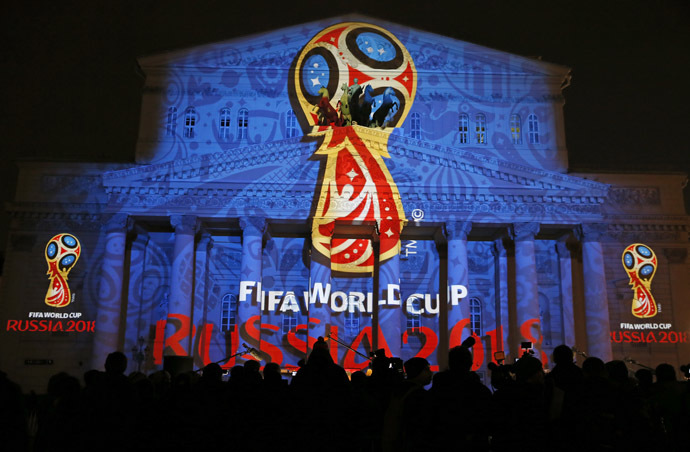
Q:Will Russia continue to support the president of FIFA Sepp Blatter even if he is indicted? We understand there's going to be more arrests from the United States.
A: We cannot be in the guessing business, and we supported Sepp Blatter during this election.
Q:Sure.
A: We didn't hide this fact as did the majority of the Executive Committee of FIFA.
Q:And your sports minister is a person of interest in the Swiss probe, is he going to cooperate?
A: I don't think he was interested.
Q:Wait... I.. Swiss authorities, if they asked to speak with Russian sports minister, will he...
A: If they want to speak with him, they have to address...
#FIFAarrests: Defiant #Blatter blasts US probe http://t.co/jvou5YikXxpic.twitter.com/U78D3SSZf8
— RT (@RT_com) 30 мая 2015
Q:..officially, yes
A: officially.
Q:And if they do, will Russia cooperate with that?
A: This is up to the office of the prosecutor general because it is through the prosecutor general that any probe request must be channeled.
Q:Suggestions that Russia may have done something towardly to win the World Cup - what do you make of that? And are we going to learn as a part of this investigation that Russia did give bribes..?
A: I don't take not of any of this stuff because we never saw any reasonable proof or anything resembling the truth.
Q:Everybody right now is talking about Greece in Western Europe.
A: Why?
READ MORE: Tsipras: Greece will seek to mend ties between Russia & EU through European institutions
Q:Is it an issue for Russia, what's happening in Greece right now?
A: Well, Greeks are a very long-standing spiritual, cultural, historical friend of Russia. We got our religion, the Orthodox Christianity from the Byzantine Empire and a thousand years later, by the way, we recognized the modern Greek state, so we have a very long common history, and of course we wish the Greek people all the best, and...
Q:And your advice to the Greek people today would be to stay in the European Union or not?
A: You're contaminated by the American philosophy. You always want to tell people what to do.
Q:No, no, no. You don't see it as Russia's role?
A: What might...
Q:Do you think that Greece would be better served exiting the EU?
A: What might be your advice to the Ukrainian people - to get to the European Union and to NATO or to stay out?
Q:Well, there's a lot less talk about that presumably..
A: No, no, no.
Q:There's a lot less talk about Ukraine joining the European Union and joining NATO - presumably - you see that is one of your successes...
A: No, no, no. I mean this American way of telling people what they have to do - that's what I had in mind.
Q:Russia has no advice to Greece?
A: It's up to the Greeks to decide, and I wish them all the best in their negotiations with the IMF and the European Central Bank and of course with Germany and France.
Q:Mr. Foreign Minister, thank you very much for your time.
A: Thank you.
Q:It's been a pleasure, as usual.





